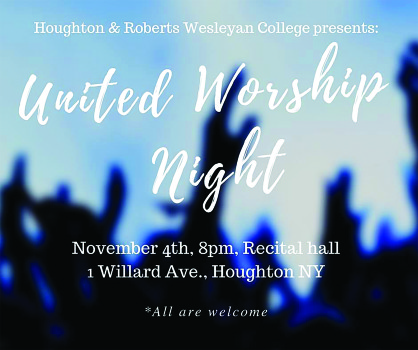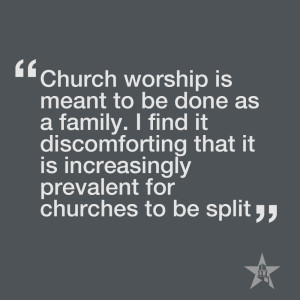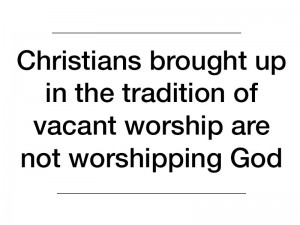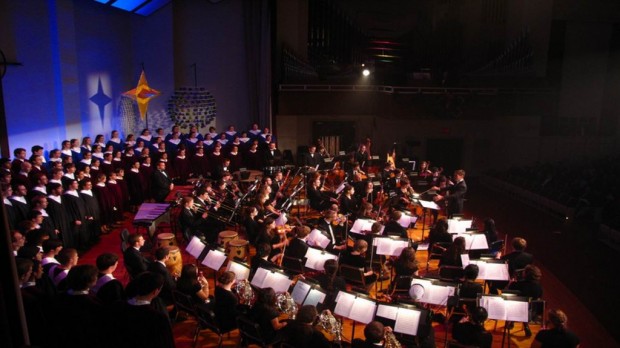Students from Roberts Wesleyan College came to campus to worship, united with Houghton students. The event, which took place in the recital hall on November 8 at 8 p.m. was run by the Student Government Association, and was intended as a way to unify the two colleges in their Christian worship. The night consisted of worship songs, prayer, and refreshments, all in the pursuit of unity between the two student bodies.
Melissa MacLean ‘17, Executive Officer of Spiritual Life, began this event last year. She said, “It all started as a dream of mine freshman year to bring the two opposing schools under one roof as worshippers of the same God.” At the time, she said, “…I didn’t have the resources to make it happen, so I left it as a dream and prayer for God to fulfill one day.” That dream, according to MacLean, was able to become a reality two years later when she “was elected into the position of Chaplain.”
Last year, the event included worship and prayer together, led by teams of students from both colleges. Ian DeHaas ’17 has been involved in the worship portion of the night both years. He said, “There’s something unique about a night of worship. Even more than the obligation of Sunday morning, the people who come out to worship together are really invested because they chose to be there. We sing together, we pray together and we remember who we are.”
This year’s event had the same format as last year’s: two colleges coming together to worship. Emily Barry ’17, another Houghton student involved in the leadership of UNITED, said, “The goal of the event is for us to come together as one body of Christ in a clear and tangible way, by worshipping and praying alongside one another. It was a beautiful and powerful testimony to see students coming together like that.”
That Friday, the leaders of UNITED were happy to see the recital hall filled again for a second year as Houghton welcomed a group of Roberts students to campus. DeHaas stated, “Once again, it was good to see the recital hall filled. We had time to pray for one another and time to connect afterward with some of the folks from Roberts. All around, it was a blessing and encouragement to see the two student bodies come together as Christ’s body.”
Now that the second year of UNITED at Houghton has taken place, the organizers are looking to the future of the event. Melissa MacLean said, “I hope to make it an annual event for the two schools, as we otherwise don’t have much contact other than sports.”
Despite the rivalry between Houghton and Roberts Wesleyan, events like the UNITED Night of Worship continue to remind students that both of these Christian colleges exist for the same reason, to bring glory to God.


 The Church has always been big on family. Many churches preach about how today’s society has lost the value of family. The divorce rate is thrown around and pastors have people raise their hands to see who actually eats dinner together. While this is a lovely sermon that I can’t disagree with, I am finding it increasingly hypocritical. Not because I find that Christians do not have whole, healthy families, but because the Church itself has ceased to be a family.
The Church has always been big on family. Many churches preach about how today’s society has lost the value of family. The divorce rate is thrown around and pastors have people raise their hands to see who actually eats dinner together. While this is a lovely sermon that I can’t disagree with, I am finding it increasingly hypocritical. Not because I find that Christians do not have whole, healthy families, but because the Church itself has ceased to be a family. ne place where ages should mingle and find solidarity in Christ, where Christians engage with and learn from different demographics, where we learn to worship together whether or not we personally enjoy drum-kits or liturgy or gospel music, is gone. Families outside of church include the mixture of ages, the compromise of living with those of a different generation, so why shouldn’t the church have that too? Shouldn’t the church be a mirror of what God intended a family to be? We use the word family because it’s all-inclusive and signifies a personable and close relation, so why make church age exclusive?
ne place where ages should mingle and find solidarity in Christ, where Christians engage with and learn from different demographics, where we learn to worship together whether or not we personally enjoy drum-kits or liturgy or gospel music, is gone. Families outside of church include the mixture of ages, the compromise of living with those of a different generation, so why shouldn’t the church have that too? Shouldn’t the church be a mirror of what God intended a family to be? We use the word family because it’s all-inclusive and signifies a personable and close relation, so why make church age exclusive?


